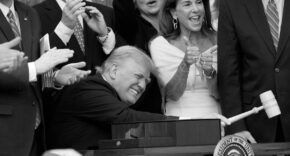Donald Trump is no longer the corporate pariah he once was. Tech industry titans—many of whom distanced themselves from Trump following the January 6, 2021, Capitol riots—are quietly warming up to the possibility of his return to the White House. Despite public neutrality or even past criticism, many CEOs are engaging in private outreach, aligning their corporate goals with the policies they anticipate under a potential Trump administration.
This shift reveals a calculated strategy, as business leaders prepare for a future where Trump’s policies—centered around deregulation, tax cuts, and trade incentives—could significantly impact the tech sector. These new alliances hint at a deeper understanding of the intersection between business and politics, one that could shape the trajectory of Silicon Valley for years to come.
From Critics to Collaborators
During Trump’s first term, many tech CEOs kept their distance. Publicly, they criticized his administration’s stance on climate change, immigration, and other key issues that didn’t align with their values. But as the political landscape evolves, so do their strategies. A notable example involves Sundar Pichai, CEO of Google. Trump recently claimed that Pichai had personally congratulated him after a viral McDonald’s stunt, though Google has declined to confirm the claim. While the truth of this anecdote remains unclear, it illustrates the growing perception of behind-the-scenes cordiality between tech leaders and the former president.
Similarly, Meta’s Mark Zuckerberg has been reportedly noncommittal in public while expressing tentative support for Trump’s potential return in private. Elon Musk, however, has taken a far more overt stance. The Tesla and SpaceX CEO has become one of Trump’s most vocal backers in the tech industry, providing both financial support and public endorsements. “I think Trump’s policies would be good for the economy and innovation,” Musk said in a recent interview, underscoring his pragmatic approach to fostering a relationship with the controversial leader.
Amazon founder Jeff Bezos—historically viewed as a rival of Trump due to the critical coverage of the Washington Post, which he owns—is also softening his stance. Observers have noted that the Post has adopted a more neutral tone on Trump’s policies as Bezos prepares to navigate potential future opportunities under a Trump-led administration.
The High-Stakes Game of Influence
At the heart of this shift lies a high-stakes game of influence. Tech leaders are positioning themselves to benefit from policies that could favor their companies. Trump’s business-friendly approach during his first term—including major corporate tax cuts and a rollback of regulatory hurdles—remains appealing, especially as companies grapple with economic uncertainty and increased government scrutiny.
For Google, a potential Trump administration might ease antitrust investigations. The company is currently embroiled in legal battles over accusations that its advertising empire violates antitrust laws. A friendlier administration could mean less regulatory pressure, allowing Google to maintain its dominance in the digital ad market. Similarly, Apple could see benefits through reduced tariffs on imports, cutting manufacturing costs and improving profit margins.
Amazon, one of the largest recipients of government contracts, stands to gain from a Trump administration that values corporate loyalty. The company’s reliance on federal partnerships makes its engagement with political leaders a necessity rather than a choice. As Trump focuses on revamping infrastructure and boosting the economy, Amazon’s logistics expertise could become a key asset in government projects.
Elon Musk’s alliances reveal perhaps the clearest benefits of aligning with Trump. Musk’s companies, Tesla and SpaceX, rely heavily on government contracts and regulatory support. “A Trump presidency could mean faster approvals for infrastructure projects and space exploration initiatives,” said an industry analyst. Musk’s outspoken support for Trump not only solidifies these opportunities but also ensures a seat at the table when future policies are crafted.
The Complex Intersection of Tech and Politics
While these alliances may seem pragmatic, they highlight the uneasy intersection of business and politics. Trump’s return to power would likely bring sweeping changes to tech regulation. His administration’s focus on modifying Section 230 of the Communications Decency Act could force platforms like Meta to overhaul their moderation policies. This would have significant implications for how content is managed online, potentially amplifying political speech and misinformation.
Moreover, Musk’s influence on Trump’s policies could reshape industries. From steering federal funding toward renewable energy projects to advancing space exploration, Musk’s corporate vision may align with Trump’s agenda, leaving smaller competitors struggling to keep up. “This is about ensuring that the big players remain dominant while smaller innovators get left behind,” noted a critic of the growing Silicon Valley-Trump alignment.
What This Means for the Future
Trump’s resurgence has turned the political landscape into a high-stakes chessboard, and tech CEOs are carefully positioning their pieces. These alliances are about more than survival; they represent a bid to shape the future of business and government in America. Whether it’s through deregulation, tax incentives, or strategic collaborations, Silicon Valley’s quiet embrace of Trump signals a shift in priorities that could redefine the industry.











